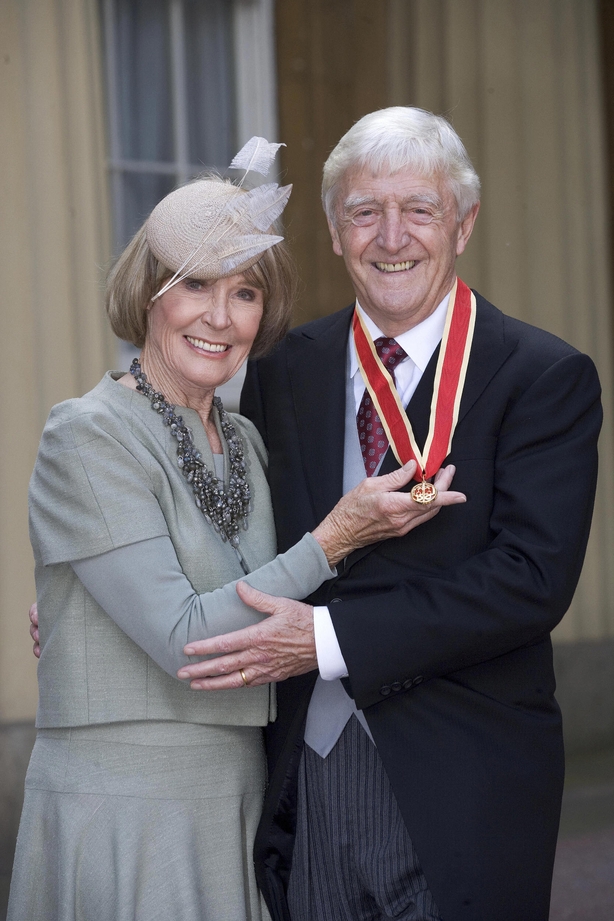The son of the late Michael Parkinson has said the world-renowned broadcaster suffered from "imposter syndrome" and "carried with him a sense of working-class guilt" during his career.
Mike Parkinson has told BBC Radio 4 that his father was "constantly questioning himself" after joining the mainstream media and "didn't have as much self-confidence as he appears", despite his onscreen success.
Michael Parkinson, known for his intimate interviews with the world's biggest celebrities, including Muhammad Ali, John Lennon and Helen Mirren, on his famous BBC chat show Parkinson, died earlier this month at the age of 88.
He came from humble beginnings - born in South Yorkshire in 1935, and growing up in a council house in Cudworth, near Barnsley.
Speaking to John Wilson on BBC Radio 4's Last Word, Mike Parkinson said that, even after his father's stratospheric success, he was "still very class-ridden".
"There were people in positions of authority, at the BBC, that were questioning his talent, questioning his right to be an interviewer," the director said.
We need your consent to load this rte-player contentWe use rte-player to manage extra content that can set cookies on your device and collect data about your activity. Please review their details and accept them to load the content.Manage Preferences
"He was always acutely aware that he was with people that he felt were brighter than him, were more educated than him.
"He went to the BBC, and he felt very much... not inferior, [but] he was very insecure.
"He was a man who was constantly questioning himself and didn't have as much self-confidence as he appears to have on television."
Despite going on to success at both Granada Television and ITV, Parkinson harboured "an innate distrust of the establishment" and had "no interest in politics".
Mike Parkinson said his grandfather's worldview had given his father "a very 'political with a small p' outlook on the world".
"He never trusted the establishment because he always felt that the establishment treated people like his father - terribly, and wrongly," he said.
"And he carried that with him all through his life. He always wanted to stand up against what he thought was unfairness.
"He wasn't interested in politics... he was interested in policy. He always was quite suspicious of people who wanted power for power's sake.
"What he was was very socially aware, and he was very political in that sense.
"And he always carried it through life - incredibly principled about things. Even to the end of his days, he was very principled."
Mike Parkinson said it was his father's love of his parents that had spurred him to accept a knighthood from Britain's Queen Elizabeth II in 2008, despite being anti-establishment.
"What you can't do is you can't take the working-class lad out of him, and you can't take the love he had for his parents out of him," he said.

"And, in the end, he couldn't honestly turn down something that would have made his father in Heaven smile and beam with pride, and also not allow his mum to have a day at the Palace. It's as simple as that, really.
"And also, you've got to understand that this says a lad who was born in a pit village, went to a grammar school... worked for the local newspaper and all of a sudden, 67 years later, he's kneeling in front of the Queen, being knighted...
"It's too good a story for a journalist and a writer not to give it the endpoint."
Michael Parkinson had always been "most proud" of his writing and journalism, having taken his first steps with local papers in Yorkshire before moving to Fleet Street.
"It gave him the most pleasure and it gave him the most feeling of satisfaction," his son said.
"He always said that 'the day job was journalism, the fun job was interviewing', because he loved it.
"He loved doing the interviewing because it was like a busman's holiday for him."
Following Michael Parkinson's death, tributes poured in from around the world from fans and high-profile figures, many of whom had been guests on Parkinson.
Mike Parkinson said the volume of reaction had been "difficult" for his family, having been related to such a beloved figure.
Becoming audibly emotional, he said: "The difficulty with having a public figure as a father is that you feel you can't grieve until everyone else has.
"It's a silly thing to say, but that's the truth - you feel that everyone else must express what they feel about him because he meant so much to them.
"And that's important because he gave... my father was a very selfless man in many ways. He spent his entire time trying to make other people look good... and also in his small way to try and make the world a bit of a better place by making people behave better.
"He meant so much to so many people but, actually, as a family, it's hard because your experience is overshadowed by noise and an outpouring that you feel almost that you have to step back from and allow that to happen, and allow that wave to subside.
"And then you, as a family, can remember him as a father, as a husband."
The full interview with Mike Parkinson can be heard on BBC Radio 4's Last Word with John Wilson and on BBC Sounds.
Source: Press Association

